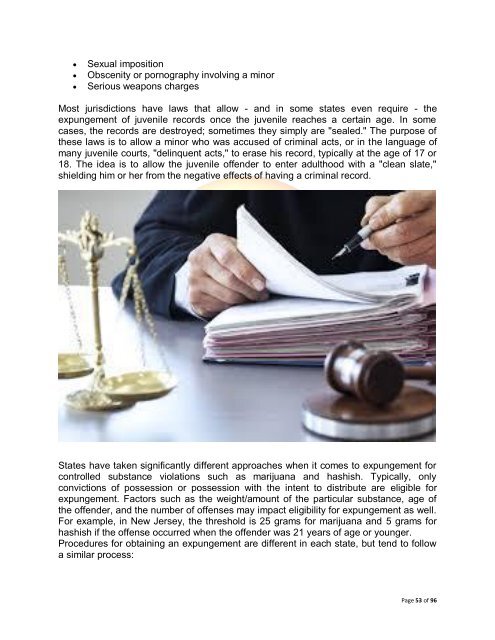Law for The Poor
Law for The Poor
Law for The Poor
Create successful ePaper yourself
Turn your PDF publications into a flip-book with our unique Google optimized e-Paper software.
Sexual imposition<br />
Obscenity or pornography involving a minor<br />
Serious weapons charges<br />
Most jurisdictions have laws that allow - and in some states even require - the<br />
expungement of juvenile records once the juvenile reaches a certain age. In some<br />
cases, the records are destroyed; sometimes they simply are "sealed." <strong>The</strong> purpose of<br />
these laws is to allow a minor who was accused of criminal acts, or in the language of<br />
many juvenile courts, "delinquent acts," to erase his record, typically at the age of 17 or<br />
18. <strong>The</strong> idea is to allow the juvenile offender to enter adulthood with a "clean slate,"<br />
shielding him or her from the negative effects of having a criminal record.<br />
States have taken significantly different approaches when it comes to expungement <strong>for</strong><br />
controlled substance violations such as marijuana and hashish. Typically, only<br />
convictions of possession or possession with the intent to distribute are eligible <strong>for</strong><br />
expungement. Factors such as the weight/amount of the particular substance, age of<br />
the offender, and the number of offenses may impact eligibility <strong>for</strong> expungement as well.<br />
For example, in New Jersey, the threshold is 25 grams <strong>for</strong> marijuana and 5 grams <strong>for</strong><br />
hashish if the offense occurred when the offender was 21 years of age or younger.<br />
Procedures <strong>for</strong> obtaining an expungement are different in each state, but tend to follow<br />
a similar process:<br />
Page 53 of 96

















